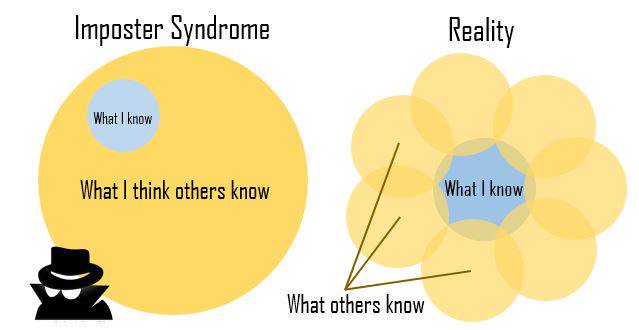Do I belong at this table?
This is the first post in a series on Impostor Syndrome among IT Pros. I will be talking about my journey, the people who have inspired me, and how we can deal with this common challenge that faces many of us.

Do I belong at this table?
At a recent event I was sitting at a table with several Microsoft team members and customers. We all had one thing in common – a love for Microsoft’s Modern Endpoint Management solutions. While I looked around the table, I started keeping score in my head. On my right were two MVPs – Matthew Hudson and Kent Agerlund. To my right was another IT Pro from a Microsoft Partner. Rion was one of the most engaging and charismatic members of the community I have had the pleasure of meeting. The rest of the table was filled with members of the Endpoint Management team at Microsoft – from engineers to project managers.
Everyone at the table was someone whom I looked up to. They were all very accomplished professionals. I had used their blogs and technical articles to build my own environment. A lot of doubt began to creep in. How did I get here? How do I stack up to the other people sitting at this table? Do I have anything to offer to the conversation? What perspective do I have to offer that the other people sitting here can’t give? It was immediately obvious to me that I didn’t have the breadth of experience or depth of knowledge of the other professionals I was sitting with. My credentials didn’t seem to measure up to theirs, and I began to question my experience. I mentioned to Rion that I was very thankful for the opportunity to be here, but that I didn’t know how I got here. I explained that I prefer to be in the company of people whom I can learn from and that in a previous role I often felt like the smartest person in the room. At this table I was anything but the smartest person. He stopped me there, giving this piece of advice: “Don’t say that. Never believe you don’t have something to contribute or that you’re not smart enough. You are here for a reason; you need to believe that.”
One of my favorite things to talk about with other professionals is how they have accomplished what they have in their careers. It is inspiring to hear where someone came from, what drove them to their level of success, and what challenges they faced along the way. Kent and Matthew are both very accomplished in our field. I admire what they have done in their careers. I also have great respect for anyone who has earned the MVP title because of their passion and dedication towards their work. While I expected that they would tell me about their accomplishments, I was surprised with their answers. They didn’t start with grand stories and listing off with everything they had done. Both of their stories were about sharing their knowledge and putting themselves out there. They both started down their journey as MVPs by sharing their experience. It wasn’t about being the best, but it was about being open.
When I started talking about my desire to start a blog, I mentioned that one of the big things that held me back was that I hadn’t really found my voice or angle yet. I didn’t know what I could write about that hadn’t already been written about a dozen times. It was hard to see what I could contribute. Matthew put it best: “It doesn’t matter if it has already been written about. It’s about your experience. You may have a different perspective that helps someone with their situation. If you want to write, then you should do it.” Kent added that he started by writing a blog with a friend. They shared the challenges they were facing and worked through them together. They put their content out there and other people found it useful.
Here were three people that I had never met before this week. Each of them was an accomplished professional. Each had far more experience than I had, and each one offered me encouragement. They never questioned my experience, asked me to list my credentials, or discouraged me. They simply offered advice and shared a bit of their journey. They couldn’t have known that their words would have a profound impact on me, but that is exactly what their encouragement did.
After returning home I knew that I needed to engage with the community more. The biggest obstacle I have faced in the last few years was allowing myself to disengage from the larger Endpoint Management community. It was a challenge of my own creation. While at a previous job, I was invited to attend the Michigan System Center User’s Group, but didn’t go. I knew my first step to re-engage was to attend one of those meetings after all. I attended my first meeting in November 2019 where Chris Thomas presented a session on the various tools and resources available to the Endpoint Management community. It was his introduction that caught my attention. He opened his session by discussing Impostor Syndrome.
The Oxford Dictionary defines Impostor Syndrome as, “the persistent inability to believe that one’s success is deserved or has been legitimately achieved as a result of one’s own efforts or skills.”
I had heard of Impostor Syndrome before; I had even thought I may have been experiencing it, but now there was another IT Pro standing here talking about my demons. That voice inside of me saying that I didn’t belong at the table with Kent, Matthew, and Rion was textbook Impostor Syndrome. One of the greatest challenges of Impostor Syndrome is that it makes you feel like you are all alone. There is an ever-present fear of being exposed as a fraud. It creates a feeling of isolation and keeps you from speaking up, even when you know you have something to contribute.
A recent study by Blind found that 58% of IT professionals have experienced Impostor Syndrome at least once in their career, but it is only now starting to really be discussed. In future blog posts I will dive more into my personal experiences, how those contributed to my Impostor Syndrome, and strategies for combating it.
The consensus is that the first step to dealing with Impostor Syndrome is to acknowledge it. Becoming more active in the community is my next step. I hope to contribute my perspective, engage with other IT Pros, and learn from the best and brightest minds in Modern Endpoint Management. We all have something to contribute and lots to learn.
If you ever wonder if you belong at the table, the answer is yes. Whether you have been in Endpoint Management for decades, just a few years, or are just starting in a new career, your voice matters. You have had unique experiences that shape your perspective, and that perspective is worth sharing. Your experiences may also inspire others. I would encourage you to engage with the community and provide your unique perspective.
If you haven’t already, please take your seat. There’s room for you at the table.
If you enjoyed this post about Impostor Syndrome, you can find more in these posts:

